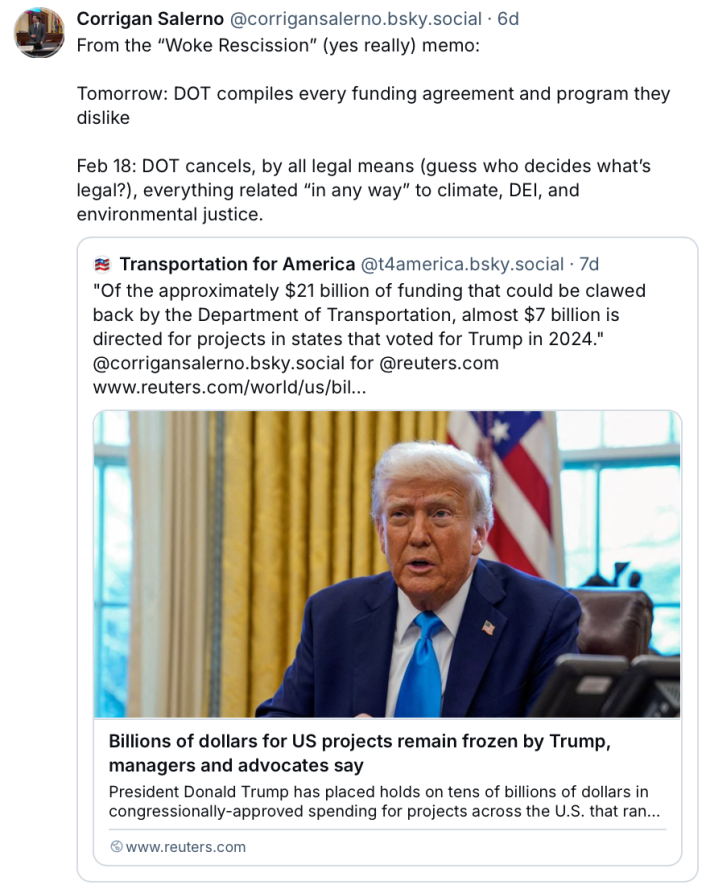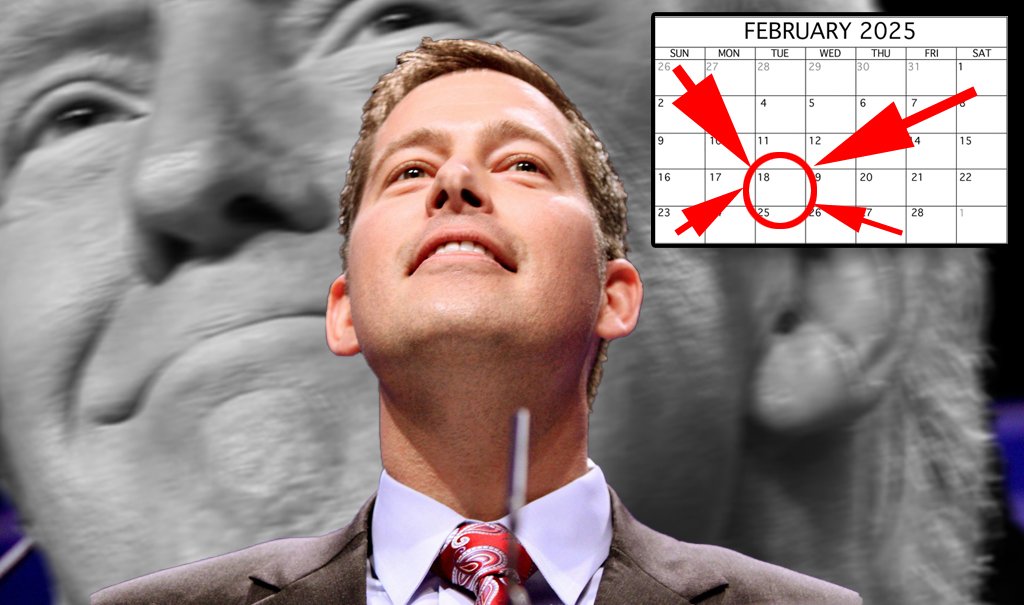Both America Walks and Transportation for America are offering simple, plug-and-play forms to contact your representatives about this issue prior to Secretary Duffy's Feb. 18 deadline.
Federal Transportation Secretary Sean Duffy is just days away from calling on Congress to make staggering cuts to sustainable modes — and advocates need to call their reps now to protect the projects they care about most, several top organizations warn.
In his earlier "Woke rescission" memo, Duffy promised on Feb. 18 to "initiate all lawful actions necessary to rescind, cancel, revoke, and terminate" any federal program or directive that violates Trump's executive orders aimed at purging from the federal government any reference to — or funding for — programs and laws that promote diversity, equity, inclusion, accessibility, or climate change mitigation.

That deadline represents the culmination of a 20-day review process kicked off by Duffy's now-infamous Jan. 29 "Woke Rescission" memo, which directed his staff to list off any possible violations of Trump's orders so he could ask Congress to slash them from laws they've already passed and funded.
And while that controversial directive drew far fewer headlines than another provocative memo issued on the same day — yes, we're talking about the one that pledged to link DOT funding to a community's fertility rates, willingness to deport immigrants en masse, their stance on vaccine and mask mandates, and more — advocates fear the Woke Rescission memo could have far more immediate and sinister implications.
"If we don’t speak up for these sources of funding now, they could disappear entirely," warned Ben Crowther of America Walks. "Right now, Congress is getting tons of messages about all sorts of programs that are threatened at the federal level. When time comes for them to negotiate, if no one is speaking up for [sustainable transportation], these will programs will be the first to be cut."
What is rescission?
Crowther explains that unlike Trump's earlier attempts to "impound" all federal funding, which were slapped with a stay by a federal judge, the congressional rescission process offers the administration a perfectly legal avenue to potentially eliminate vast swaths of federal transportation funding and policies that the last Congress approved, by asking the current GOP-held congress to essentially line out items Trump doesn't like.
Because active and shared modes are some of our best tools to address climate change and societal inequities, that leaves programs that fund them uniquely vulnerable to a green/woke witch hunt. That could end with them sustainable modes being cut out of critical bills like the Bipartisan Infrastructure Law altogether — and potentially, set the stage for them being excluded from the next transportation bill, too, when the law expires in 2026.
It's hard to calculate exactly how much money for sustainable modes is at stake, but America Walks estimates at least $3 billion has been promised to U.S. communities for walking projects alone that hasn't yet been delivered by Washington. And because grant recipients generally begin spending their federal grant dollars soon after US DOT drops a press release promising to reimburse them, that could leave countless communities on the hook to make up any cash Congress might rescind, or at least leave in flux the matching dollars they were required to put up in order to receive federal money.
The scope of those losses could be particularly large if Duffy takes the unprecedented step of recommending that Congress rescind DOT's "formula" grant for transit — of which all states are guaranteed to receive at least some money based on a set calculation – rather than just the discretionary grants that Pete Buttigieg doled out in the last months of his term. (And considering that Trump has already frozen the National Electric Vehicle Infrastructure program, whose disbursements are calculated by formula, that's looking increasingly likely.)
If the Trump administration does that, advocates at Transportation for America estimate that more than $20 billion of funding could be at risk.
"We need to demonstrate demand for these projects early and often," added Crowther. "We need to send a strong signal that people want to protect funding for walking, biking, and transit — and they want it to continue to be expanded."
To really make that message heard, both Crowther and his colleagues recommend that advocates first research exactly how much a "woke" funding rescission would harm their community, and make sure their representatives understand just how much they stand to lose.
The organization has compiled an interactive map that gives advocates a rough estimate of that number just by hovering over their congressional district (above). Policy Manager Corrigan Salerno has also offered to help identify specific local projects that could be cancelled by the memo — email corrigan.salerno@t4america.org for help — though those projects are not posted on the website because advocates are "trying to minimize how much of [the Trump administration's] work [they] might do for them, in terms of identifying what specifics to cut."
To really go the extra mile, Salerno says advocates should make sure to reach out to all levels of government, including elected at the city level who these projects will impact most.
"Make sure to not just confront your Congressional representatives," Salerno added. "Your local elected officials should be amplifying your requests for clarity to Congress and asking questions about specific local projects. Make sure to follow back up with local electeds and ensure they know how federal funding that should flow to your community will be disrupted."
Most of all, Crowther and Salerno both caution advocates not to shrug off Duffy's memo as simple partisan posturing. And they say we also shouldn't assume that the purge would inadvertently eliminate grants about which advocates are skeptical, like Reconnecting Communities recipients who proposed to cap highways they were also actively widening.
"In an ideal world, we’d hope for a true moratorium on highway expansion," Crowther added. "In reality, groups like the American Association of State Highway and Transportation Officials, are lobbying behind the scenes to get highway building projects back on the books, and they can take or leave programs like Reconnecting Communities and Safe Streets and Roads for All. We expect the administration probably has similar priorities, so it’s really important for advocates to speak up right now."






